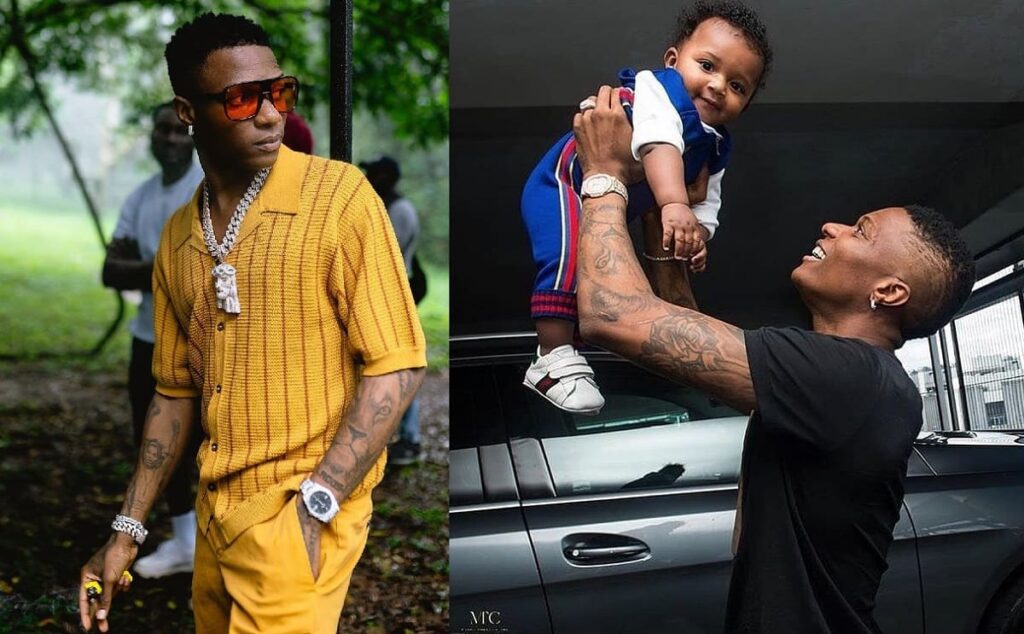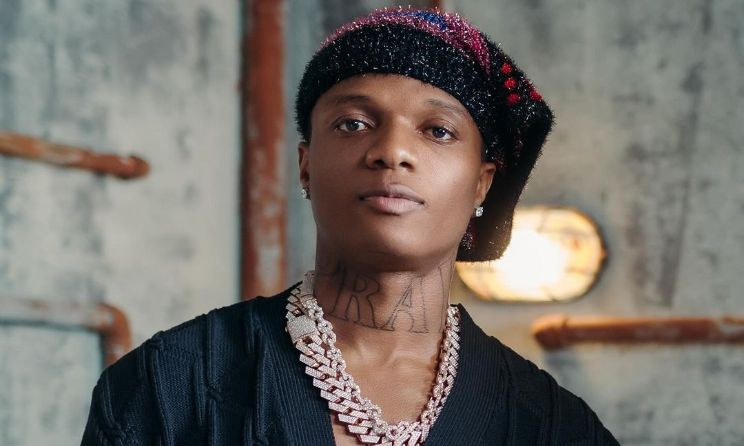Ayodeji Ibrahim Balogun, better known as Wizkid, was born on July 16, 1990, in Surulere, Lagos, Nigeria. He grew up in a large family, being the youngest of 13 siblings.
Wizkid’s family was deeply rooted in religion; his father practiced Islam while his mother was a Christian. Wizkid’s interest in music began at a young age. By the age of 11, he was already active in his local church choir, where he honed his singing skills.
He formed a group called Glorious Five with some of his friends, and together, they released an album. Though it didn’t bring commercial success but was a pivotal moment in shaping his musical path.
Wizkid attended Ijebu Ode Grammar School and later enrolled at Lagos State University (LASU) before transferring to Lead City University, where he eventually dropped out to focus entirely on his music career. His decision to pursue music full-time proved to be a life-changing one.
Musical Career
Wizkid’s professional music career began when he met OJB Jezreel, a record producer and music executive who mentored him. At OJB’s studio, Wizkid got the chance to interact with some of Nigeria’s biggest artists at the time, including 2Baba and Sound Sultan.
He observed and learned the intricacies of music production, writing, and vocal performance. It was during this period that he met Banky W, the founder of Empire Mates Entertainment (EME).
In 2009, Wizkid signed a record deal with EME, which became a turning point in his career. He began working on his debut studio album and contributed vocals to some of EME’s projects.
His major breakthrough came in 2010 with the release of the single “Holla at Your Boy”, which became a massive hit in Nigeria and catapulted him to stardom. The song earned him multiple awards, including the Next Rated Award at the 2011 Headies.
Debut album “Superstar”
Following the success of “Holla at Your Boy,” Wizkid released his debut album “Superstar” on June 12, 2011. The album was a commercial success, featuring hit singles like “Tease Me/Bad Guys,” “Don’t Dull,” and “Pakurumo.” The blend of Afrobeats, reggae, and R&B showcased Wizkid’s versatility and cemented his place as a rising star in the Nigerian music industry.
“Superstar” received critical acclaim for its production quality, lyrical content, and innovative approach to Nigerian pop music. Wizkid quickly became one of the most sought-after young artists in Africa, with his sound resonating beyond the continent.
Second album “Ayo”
In 2014, Wizkid released his second studio album, “Ayo”. The album featured collaborations with prominent Nigerian and international artists, including Femi Kuti, Akon, Tyga, and Wale. While the album wasn’t as universally praised as “Superstar,” it contained one of the most important songs in Wizkid’s career: “Ojuelegba.”

“Ojuelegba,” which tells the story of Wizkid’s struggles and rise to fame, became a cultural anthem. The track was widely appreciated for its emotional depth and relatable lyrics. Most importantly, it resonated with fans across Africa and the African diaspora. The song gained international recognition when Drake and Skepta jumped on the remix in 2015, further boosting Wizkid’s profile on the global stage.
With the success of “Ojuelegba,” Wizkid began to gain attention from international audiences, and his music became increasingly accessible worldwide.
Third album, “Sounds from the Other Side” and collaborations
Wizkid’s meteoric rise continued when he collaborated with Drake on the global hit single “One Dance” in 2016. The song, which was part of Drake’s album “Views,” became a massive success, topping charts in over 15 countries, including the Billboard Hot 100. “One Dance” marked a historic moment for Afrobeats, as it was the first time the genre received such widespread recognition on a global platform.
This collaboration solidified Wizkid’s position as an international artist and opened the doors for more collaborations with globally renowned artists. Following “One Dance,” Wizkid worked with the likes of Chris Brown, Trey Songz, Ty Dolla Sign, Major Lazer, and more.
Read Also: How Much Does Netflix Pay for Nigerian Movies?
In 2017, Wizkid released his third studio album, “Sounds from the Other Side”, under RCA Records and Sony Music International. The album was aimed at blending Afrobeats with mainstream international sounds like dancehall, reggae, and R&B. While it didn’t perform as well commercially as expected, it marked a significant shift in Wizkid’s career as an artist capable of crossing over to Western markets.
“Sounds from the Other Side” included hit singles such as “Come Closer” featuring Drake and “Daddy Yo,” both of which further established Wizkid as a global force in music.
Fourth album “Made in Lagos” and global domination
In 2020, Wizkid released his highly anticipated fourth studio album, “Made in Lagos”. The album was met with widespread acclaim and was considered a major cultural moment for Afrobeats. “Made in Lagos” was a celebration of Nigerian music, culture, and heritage, with its mellow production, smooth vocals, and impeccable songwriting. The album featured collaborations with artists like Burna Boy, Tems, H.E.R., Skepta, and Damian Marley.
The standout single from the album, “Essence” featuring Tems, became an instant hit and is widely regarded as one of Wizkid’s greatest achievements. The song was a sleeper hit that gained global recognition, becoming the first Nigerian song to chart on the Billboard Hot 100. In 2021, a remix of “Essence” featuring Justin Bieber was released, propelling the song to new heights. It became a summer anthem in many countries and earned multiple award nominations, including a Grammy Award nomination for Best Global Music Performance.
“Made in Lagos” received critical acclaim for its production, lyricism, and the way it fused Afrobeats with global music trends. The album was included in several year-end lists of the best albums of 2020 by publications such as Rolling Stone and Pitchfork.
Influence and Legacy
Wizkid’s influence on Afrobeats and the global music landscape cannot be overstated. He played a pivotal role in bringing African music to the forefront of global pop culture, inspiring a new generation of African artists to reach for international success.

He has been an advocate for the expansion of Afrobeats, continuously pushing boundaries with his sound and collaborations. By working with international superstars like Beyoncé, Drake, Skepta, and Justin Bieber, Wizkid helped introduce Afrobeats to mainstream audiences outside of Africa. His unique ability to blend African rhythms with Western pop elements has made him a trailblazer and a symbol of Africa’s burgeoning music industry.
Awards
Wizkid has received numerous awards and accolades throughout his career, recognizing his contributions to the music industry and his impact on Afrobeats. Here are some of his most notable achievements:
Grammy Awards
- Best Global Music Performance (2021) for “Essence” featuring Tems
MTV Europe Music Awards
- Best African Act (2012, 2013, 2014, 2016, 2017, 2018, 2021)
- Global Icon Award (2021)
BET Awards
- Best International Act: Africa (2012, 2014, 2015, 2016, 2017, 2018, 2019, 2021)
- Best Collaboration (2021) for “Essence” featuring Tems
The Headies
- Artiste of the Year (2011, 2012, 2014, 2015, 2016, 2017, 2018, 2019, 2021)
- Album of the Year (2011, 2014, 2017, 2020)
- Song of the Year (2011, 2012, 2014, 2015, 2016, 2017, 2018, 2019, 2021)
All Africa Music Awards
- Artiste of the Year (2012, 2013, 2014, 2015, 2016, 2017, 2018, 2019, 2021)
- Album of the Year (2012, 2014, 2017, 2020)
- Song of the Year (2012, 2014, 2015, 2016, 2017, 2018, 2019, 2021)
World Music Awards
- Best African Act (2012, 2013, 2014, 2015, 2016, 2017, 2018, 2019, 2021)
iHeartRadio Music Awards
- Best New Pop Artist (2017)
Soul Train Awards
- Best International Performance (2021) for “Essence” featuring Tems
These are just a few of the many awards and recognitions that Wizkid has received throughout his career. His numerous accolades solidify his status as one of the most influential and successful artists in Afrobeats.
Personal Life
Despite his success, Wizkid has remained relatively private about his personal life. He has three children from different relationships, and he often emphasizes the importance of family in interviews. Though his relationships with the mothers of his children have at times been controversial, Wizkid continues to maintain a strong connection with his children.

Wizkid, the Nigerian superstar, has three children with three different women. His first son, Boluwatife Balogun, was born in 2011 to Shola Ogudu. Their relationship was initially rocky, with public disputes but they have since worked on co-parenting. His second son, Ayodeji Balogun, was born in 2016 to Binta Diallo, a Guinean-American model. Binta had to conduct a DNA test to prove Wizkid’s paternity, and though their co-parenting has faced challenges, Wizkid acknowledges his son.
His third child, Zion Balogun, was born in 2017 to Jada Pollock, his manager. Their relationship is more private and harmonious, with Wizkid openly expressing his love for Zion, often sharing moments with him on social media.
Endorsement Deals
Beyond music, Wizkid signed endorsement deals with several global brands, including Pepsi, MTN, Guinness, UBA, and Tecno. And he has consistently been one of the highest-earning musicians in Africa. In addition, Wizkid has been involved in numerous charitable efforts, donating to various causes such as education, healthcare, and youth empowerment.
Wizkid’s influence extends beyond music. He has become a cultural icon who represents the resilience, creativity, and innovation of African youth. His style, often a mix of street fashion and luxury brands, has made him a fashion trendsetter in Africa and beyond.
Conclusion
Wizkid’s journey from the streets of Surulere to becoming a global music icon is a testament to his talent, hard work, and vision. He has been at the forefront of Afrobeat’ global rise and has helped to shape the sound of contemporary African music. With his continued success and influence, Wizkid is poised to remain one of Africa’s greatest musical exports for years to come.
His legacy is not just about his music but also about breaking down barriers for African artists and opening doors for future generations to thrive on the global stage.






































Discussion about this post